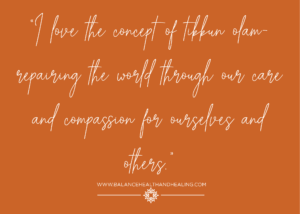I had the unusual experience last week of coming across the same unfamiliar concept while reading two unrelated books! It was enough to make me pause- and get curious- and want to explore more about the concept I hadn’t even heard of before the week started.
I first came across the phrase “tikkun olam” in Elizabeth Smart’s book, Where There’s Hope. She described the Hebrew phrase as translating roughly to “repair the world”, and spoke about the Jewish belief that our acts of kindness towards each other can be a powerful agent of healing in the world.
A few days later, I was surprised to see the same concept referenced in Sheryl Sandberg’s book, Lean In. At that point, I knew I had a date with google to explore more about this concept!
Exploration
In my exploring, I read that tikkun olam is an idea from the Mishnah, a body of classical rabbinic teachings, and describes “any activity that improves the world, bringing it closer to the harmonious state for which it was created” (Freeman, 2017). Freeman goes on to state that tikkun olam implies that while the world is innately good, “its Creator purposely left room for us to improve upon His work. All human activities are opportunities to fulfill this mission” (2017).
state for which it was created” (Freeman, 2017). Freeman goes on to state that tikkun olam implies that while the world is innately good, “its Creator purposely left room for us to improve upon His work. All human activities are opportunities to fulfill this mission” (2017).
So tikkun olam, I learned, means to do something in the world that will repair or heal, but also to improve. I started to ponder- what improvement and healing does our world need? What is my role in that?
The concept fills me with a sense of purpose, but the reality is- much of my day to day living is pretty routine and scheduled. I do many of the same activities day in and day out- working and completing tasks to take care of my home and family. As I explored the concept of tikkun olam on MyJewishLearning.com, I was intrigued to read about the idea that EVERY activity you do contains a spark of the divine and the potential for healing the world (MJL, 2003). “Our job… is to find those divine sparks, select them, and reconnect them to their original, higher purpose…How do we find those sparks? Simply by doing those same activities, but in a way that reveals a higher, divine meaning” (MJL, 2003).
The article explores the act of eating as one of the mundane daily tasks we engage in, not often thinking of it as an act of healing or repair. “You might eat just to fill an empty stomach. But you could also eat in order to derive energy from the nutrients of your food, and then channel that energy into fulfilling your divine mission in life…Every aspect of a person’s life, even the most seemingly mundane, has purpose and provides an opportunity for tikkun olam” (MJL, 2003).
Connection
 There is power in intentional living- in seeing purpose and finding meaning in our activities. It seems, too, that there is an idea of connection in tikkun olam- that we are connected to each other and our world in meaningful ways. Taking the time to notice and tend to those connections can build a purposeful life, and brings the potential for healing and repair to ourselves and others.
There is power in intentional living- in seeing purpose and finding meaning in our activities. It seems, too, that there is an idea of connection in tikkun olam- that we are connected to each other and our world in meaningful ways. Taking the time to notice and tend to those connections can build a purposeful life, and brings the potential for healing and repair to ourselves and others.
Freeman’s article taught, “The rabbis of the Talmud encouraged all the people, no matter how spiritually or intellectually inclined, to contribute to the common good. That meant building homes and families, and creating a civil society filled with deeds of caring and compassion, sustained by justice, integrity and peace” (2017).
I love the concept of tikkun olam- repairing the world through our care and compassion for ourselves and others. It’s given me a framework to view the tasks I do in a new and more meaningful way by asking the question, “how am I contributing to the healing of the world today?”
References
Freeman, T. (2017, June 12). What Is Tikkun Olam? – What does Tikkun Olam mean, who came up with it, and how do I do it? Retrieved from https://www.chabad.org/library/article_cdo/aid/3700275/jewish/What-Is-Tikkun-Olam.htm.
MJL. (2003, July 25). Tikkun Olam: Repairing the World. Retrieved from https://www.myjewishlearning.com/article/tikkun-olam-repairing-the-world/.

